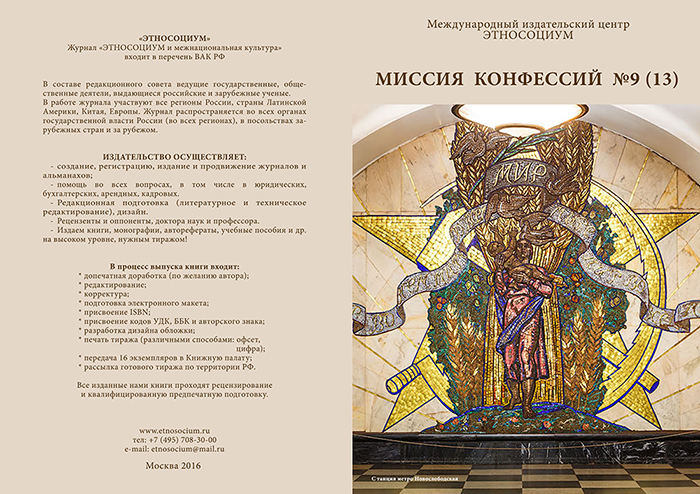Content
|
PHILOSOPHY, SOCIOLOGY AND CULTURE
|
|
|
Dzutsev H.V. The Evolution of Religious Beliefs of the Population of North Caucasus Federal District
|
6
|
|
Valdes Odriosola M.S. Religious Motives in the Moscow’s Metro Stations Design
|
15
|
|
RELIGION: PAST AND PRESENT
|
|
|
Vlasov V.I. The dialectics of stability and instability of society: the case of Russian History
|
24
|
|
Ivanova T.S., Brik T.A. The Mission of Confessions in the Face of Global Threats: Vatican and Pope Francis in the World Politics
|
38
|
|
President Vladimir Putin signed a law on the protection of religious samostroya from demolition
|
49
|
|
COMPETITION. TOURISM AND RELIGION
|
|
|
Belikov M.Y., Volkova T.A., Mishchenko A.A., Sidorova D.V. The Problems and Perspectives of Tourism Development in the South of Russia: the Crimea and the Krasnodar Region
|
53
|
|
Abstracts
|
60
|
|
Authors
|
64
|
Abstracts
Dzutsev H.V.
The Evolution of Religious Beliefs of the Population of North Caucasus Federal District
This article is written based on four books of “Documentary History of Education of the multinational Russian state: Russia and the North Caucasus in the XVI-XIX centuries.” M., 1998. The review of the sources listed in the edition allows to consider the causes of the current situation of the three-century opposition of the sentimentally religious mountain peoples of the North Caucasus and the official authorities of the Russian center. The author concludes that all the conflicts on the pointed territory are more of economic and ethnic character than of the religious one.
Keywords: transformation, Christianity, Islam, Vainakh tribes, anti-colonial movement, Muridism, Sultan firmans, Imamate, jihad, imam, sharia.
Valdes Odriosola M.S.
Religious Motives in the Moscow’s Metro Stations Design
The article is devoted to one of the Moscow’s metro station most interesting and seemingly paradoxical monumental design theme. Religious motives in the underground station design appeared in the Pre-War era. The peak of its prosperity sacred theme survived during the Great Patriotic war and the first postwar decade, and was also preserved in the station design even during the anti-clerical campaign of the 1960s-1970.
Keywords: Moscow, metro, religious motives, sacred theme, monumental design, anticlerical campaign.
Ivanova T.S.
Brik T.A.
The Mission of Confessions in the Face of Global Threats: Vatican and Pope Francis in the World Politics
As a rule, church activity is associated with the spiritual side of people’s life. However, exactly today Vatican, lead by Pope Francis, assumes an especially active position on many issues, which have traditionally been part of the political sphere of life.
In the article, the authors emphasize three issues that are nowadays in the eye of the Hole See. They are ecological problems, consequences of the growing consumer cult and peace-keeping activities. The authors give arguments that the Catholic Church today not only appeals to the union of all peoples in the face of world threats, but also gives impulse to practical solution of some tasks for the sake of all humankind.
Keywords: Vatican, Pope Francis, sphere, globalization, culture, mission of confessions, ecology, the UN, Catholic church.
Belikov M.Y.
Volkova T.A.
Mishchenko A.A.
Sidorova D.V.
The Problems and Perspectives of Tourism Development in the South of Russia: the Crimea and the Krasnodar Region
The article deals with the fact of reallocation of touristic flow associated with the changes in geo-economical and geopolitical situation. The authors state that economic sanctions of Western countries initially shook the desire of Russian tourists to rest abroad. Besides, the attraction of Russian resorts is artificially enhanced by the growth of rates of foreign currencies against the Russian rouble, which reduces significantly the purchasing power of the Russian citizens in relation to the proposed foreign travel products. Thus, the inclusion of the Republic of Crimea into the Russian Federation fully transformed the market of touristic services of the Krasnodar Krai.
The authors conclude that the expected inflow of tourists did not happen due to the problems of transport infrastructure (the absence of a bridge across the Kerch Strait and the low availability of the ferry line). At the moment the situation is worsened by the unstable situation in the Crimea on the border territory with Ukraine and the energy blockade of the Crimea.
Keywords: tourism, tourist-recreational complex, Krasnodar Krai, Republic of Crimea.
Authors
Belikov M.Y., Kuban State University, Krasnodar region, Krasnodar.
Brik T.A., Chief Project Manager of «Etnosotsium».
Dzutsev H.V., Doctor of Social Sciences, head of the North Ossetian Social Research Center, Institute of Socio-Political Studies, Head of the department of sociology and social processes of K.L. Khetagurov North Ossetian State University, Vladikavkaz.
Ivanova T.S., Post-graduate student of the National Security Department, Institute of Law and National Security. Russian Presidential Academy of National Economy and Public Administration. Supervisor of the “eLibrary” project at the International Publishing House “Etnosocium”.
Mishchenko A.A., Kuban State University, Krasnodar region, Krasnodar.
Sidorova D.V., Kuban State University, Krasnodar region, Krasnodar.
Valdes Odriosola M.S., Graduate student of the chair of philosophy, cultural and political sciences of Moscow University for the Humanities, the member of Moscow section of Union of Artists of Russia, the member of the Union of Journalists of Moscow, the member of the National Historian’s Unification of Science and Technology of Russia, the winner of the State scholarships for outstanding figures of culture and art, as well as talented young authors literary, musical and artistic works.
Vlasov V.I., Doctor of Juridical Sciences, Professor.
Volkova T.A., Kuban State University, Krasnodar region, Krasnodar.





